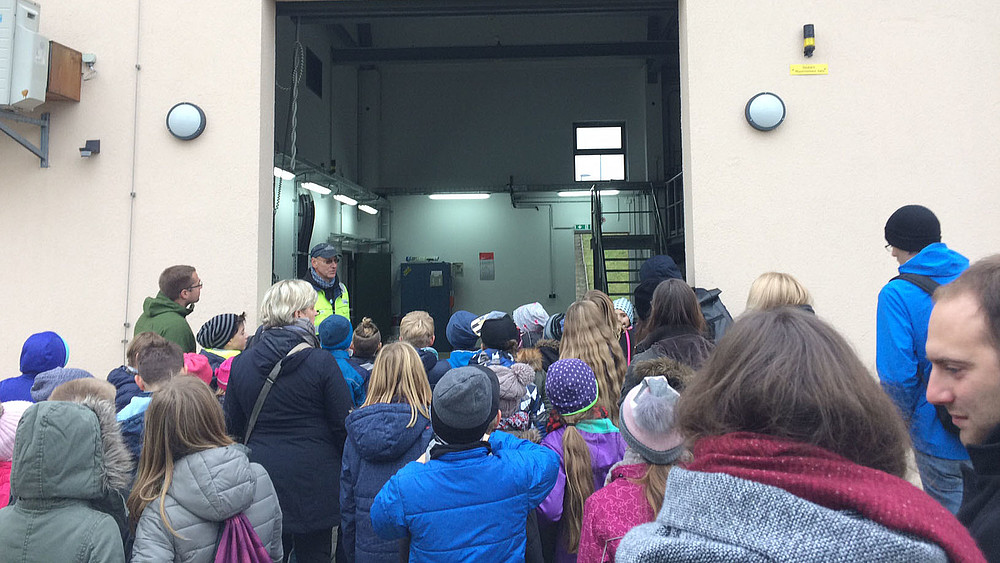The motto of Environment Day 2017 was "Plastic everywhere". The HSZG shows the uncomfortable truth.

For the 7th time, the city of Zittau and the Zittau/Görlitz University of Applied Sciences jointly organized the Day of the Environment. This year's motto was "Plastic everywhere". On Wednesday, November 8, environmentalists and scientists discussed plastic waste polluting the oceans and recycling concepts that offer hope. Girls and boys from the Zittau climate schools - Christian-Weise-Gymnasium and Weinau-Oberschule - created an exhibition for "Environment Day".
What does the shopping bag from the supermarket have to do with a strangled seal in the Indian Ocean? Nothing, of course, you think? Many thought so. During the 8 a.m. lecture by Dr. Gernot Kayser from the International University Institute Zittau (IHI), the tenth graders from Zittau's climate schools look up briefly from their cell phones when the baby seal appears on the screen with sad saucer eyes. The lecture hall falls silent, the seal has become entangled in a fishing net and a lot of plastic bags. And when you get right down to it, it's our fault.
Plastic has been produced for over 60 years. When we throw away packaging, it is gone for the time being - at least out of our sight. But plastic is extremely durable, what was produced 60 years ago is still alive today, has not rotted away and is very likely floating in the sea. Together with around two million cigarette butts, beer mats and plastic cutlery from MC Donalds.
A few members of the audience at the lecture "Macro- and microplastics in the sea" put their plastic bottles back in their bags. We don't live by the sea, we don't see the floating plastic islands, and we don't see any strangled seals. But a quarter of the fish on the markets in the USA and Indonesia are proven to contain plastic particles. We don't know whether the fish in the freezer is from Indonesia. And this is just a consequence of our way of life.
After the presentation by IHI Zittau, we went on an excursion to the sewage treatment plant. In addition to the interested participants of the Environment Day, around 40 children from the Weinau School were also there. The fourth-graders asked the questions that the adults were afraid to ask: "When can you drink the water that smells so bad?" The SOWAG employees who guided the group around the site got a lot of children's hands snapping up at all their questions.
"Who knows what's in the wastewater?"
"Ear sticks!", "Poop!", "And a bit of vomit!"
Sewage disposal is a mandatory municipal task and primarily serves to protect health. The wastewater reaches the treatment plants via the sewer network. This is the lowest point, all water flows there. It is then purified again and again in a complex process and many water basins and finally discharged back into the Neisse. However, no drinking water is produced. Only the waste water is treated in Chopinstraße in Zittau.
Incidentally, food waste, such as pumpkin soup that has gone bad, does not belong in the toilet but in the compost or organic waste garbage can, otherwise the rats are attracted and multiply more quickly.
Environment Day, which is entirely dedicated to the topic of plastic, is not intended to be a day of accusation. It's not just that. It's about raising awareness, providing information and, above all, presenting alternatives that offer hope. Large companies such as Adidas are leading the way with running shoes made from ocean waste. Zittau is following suit: the environmental lobby, Greenpeace Dresden, wants to set up a group in Zittau. On December 1, all interested parties will meet at 6 p.m. in Cafe Jolesch, Klienebergerplatz 1 in Zittau.
In Haus Z IV, you could recycle plastic with the association konglomerat e.V. from Dresden. Anyone who wants to can join in at any time in Dresden at the Rosenwerk plastics forge.
To get in the mood for the film "A Plastic Ocean" in the Kronenkino, there was a Vokü (people's kitchen) with vegan burgers in the foyer and inspiring conversations about Environment Day.
The film focused on the death of coral reefs caused by humans, their interaction with nature and the masses of plastic that are already floating in the oceans and will probably never be completely removed. Plasticizers escape from the plastic. Sun, seawater and time cause the plastic to break down into its individual parts and turn it into microplastics that are even more difficult to handle because they are barely visible.
After the credits, there is only one feeling: powerlessness. A discussion unfolds from the stage to the audience. If everything is hopeless anyway, all the plastic can never be removed from the oceans, what can be changed at all? Until project collaborator Eric Schön from the Faculty of Natural and Environmental Sciences and co-initiator of Environment Day, takes the floor and reassures people. He thanks them for the day and the stimulating discussions. And that this is exactly the beginning.
In Germany, coffee-to-go cups generate 40,000 tons of waste every year. That corresponds to the weight of 33,000 Volkswagens. It would already do a lot to put the delicious drinking water from our mountains in a glass bottle and the coffee in a sustainable coffee cup.